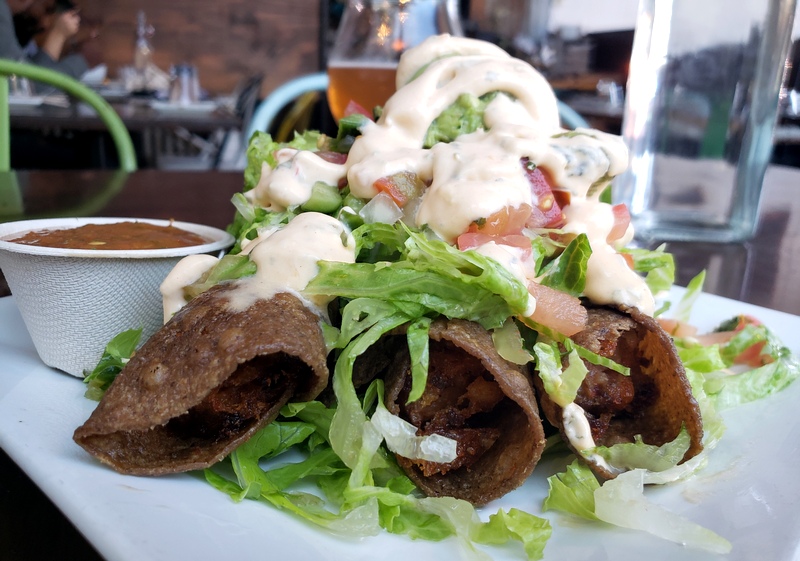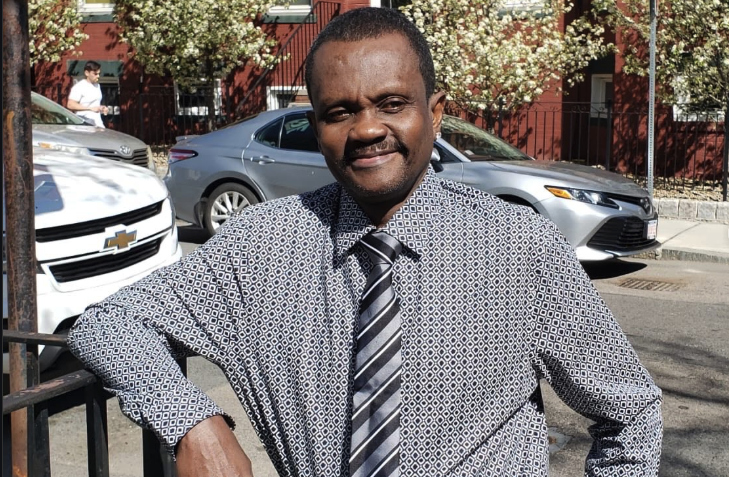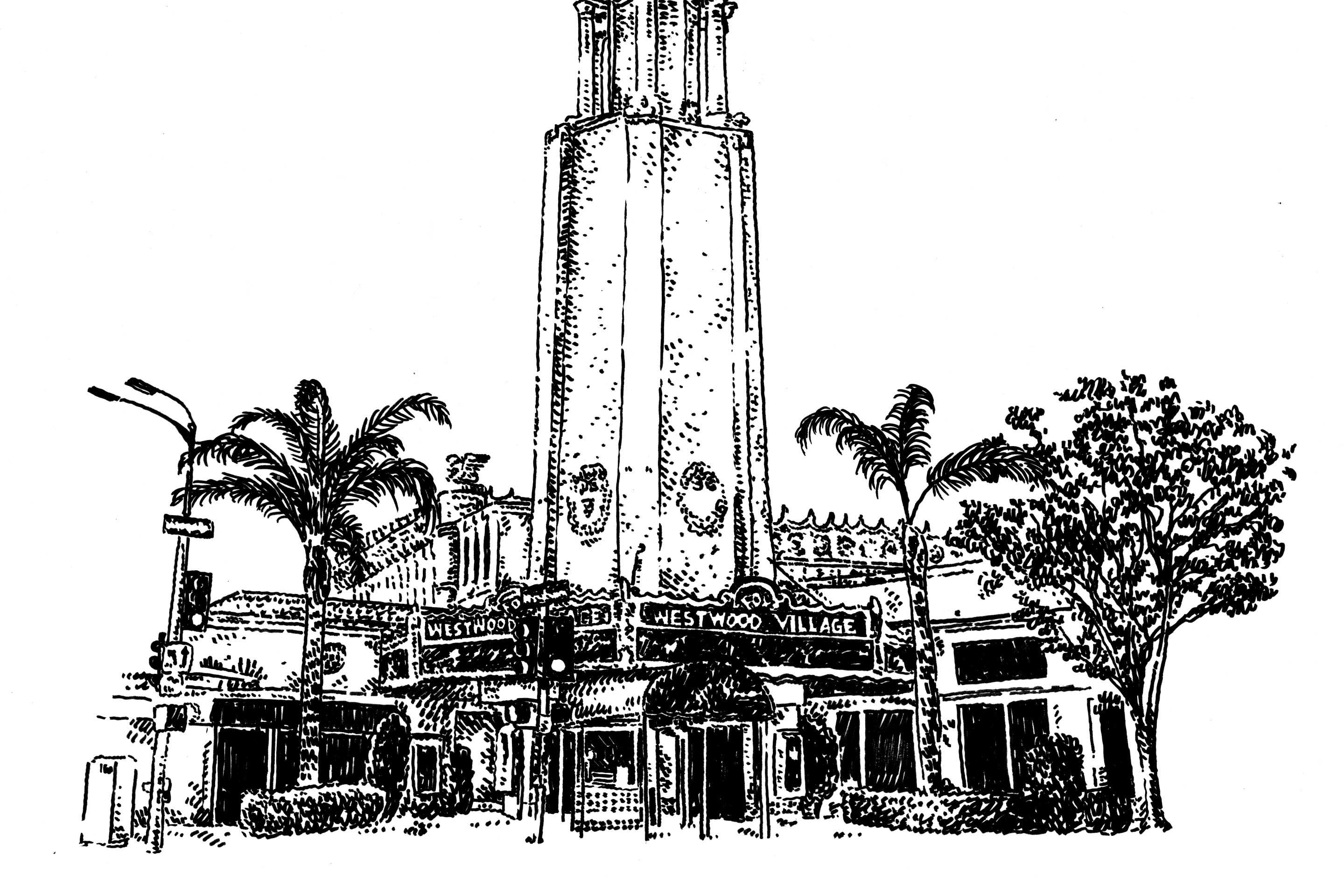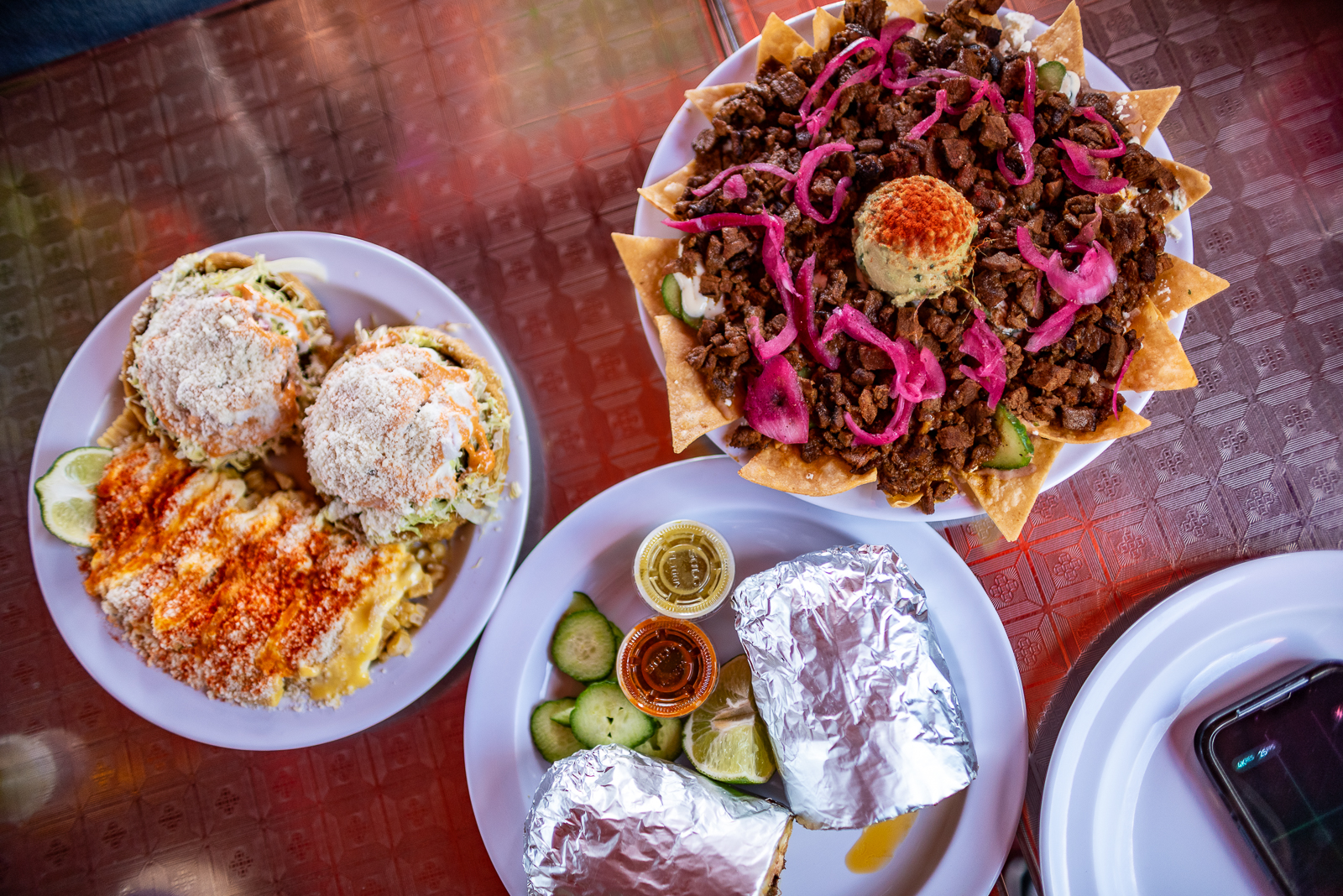Maybe it’s the fallen vegetarian in us. Maybe we love the smell of death threats in the morning.
Whatever our damage, we’re sitting at Sage Regenerative Kitchen & Bistro in Echo Park on September 11th, trying to bury the ghosts of an office view from the 106th floor of the World Trade Center, one eye sentry over our shoulder for religious zealots toting AR-15s or an enraged animal rights activist with a butcher knife.
Formerly known as Sage Vegan Bistro, a staunch shelter of cruelty-free dining with two L.A. locations, the restaurant vaulted to the center of controversy this past spring following its rechristening as Sage Regenerative Kitchen, which followed its decision to begin serving dairy, meat, and eggs from regenerative farms.
Apoplectic that this tabernacle of tempeh was turning its back on unconditional veganism and the tenants of ahimsa, former fans now spewed invective, threats, and poxes-upon-the-home of owner and lifelong vegetarian Mollie Engelhart, whose father and stepmother founded Cafe Gratitude, the touchstone of hippie-souled, capitalist-spirited vegan eateries. PETA was pissed.
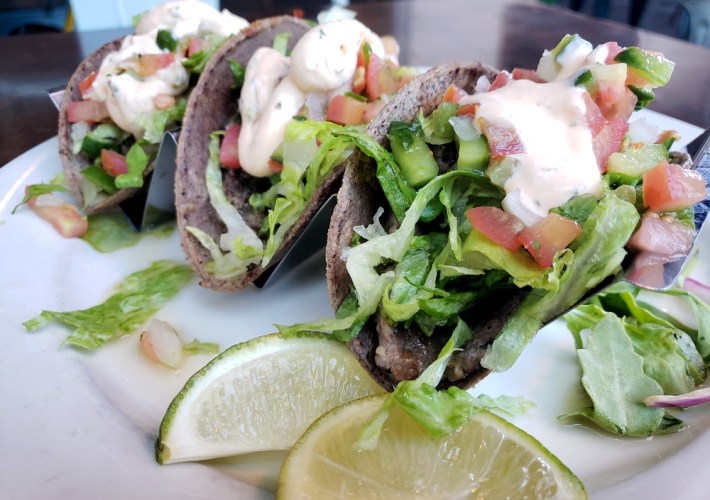
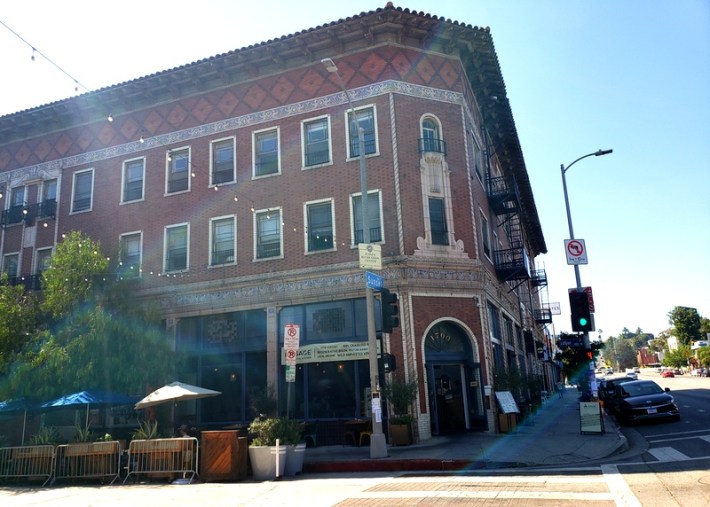
Engelhart had not exactly morphed into Leatherface, defending her decision repeatedly and eloquently in print, video, and on public radio. Her defense for serving animal products from regenerative ranches laid out how crop production, as currently executed by the corporate monsters of industrial agriculture, has put soil in dire straits through the use of pesticides and chemicals, monocropping, and concentrated animal feeding operations.
Destruction of the soil damages its natural superpower to capture carbon and increases other damages and dangers for consumers and the planet. More released carbon means fewer days until the apocalypse and 110-degree days of driving through the San Fernando Valley. In addition, restorative practices promise additional benefits for the environment, human health, and animal welfare.
Engelhart, still a vegetarian and a past board member of the nonprofit Kiss the Soil, explained her position to Bon Appetit: “There were a thousand awakening moments where I recognized that we can work with animals to create much better soil, much better human health, and much better environmental health. The awakening was slow, to be honest, because I was looking through a lens of veganism, and my view was that nothing should die.”
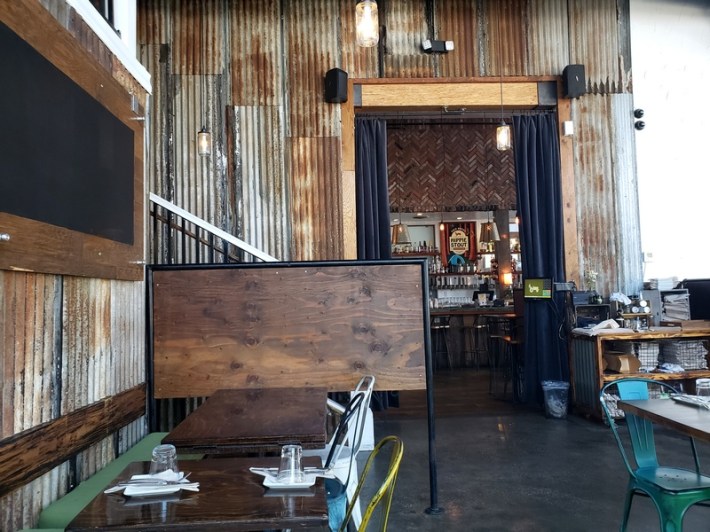
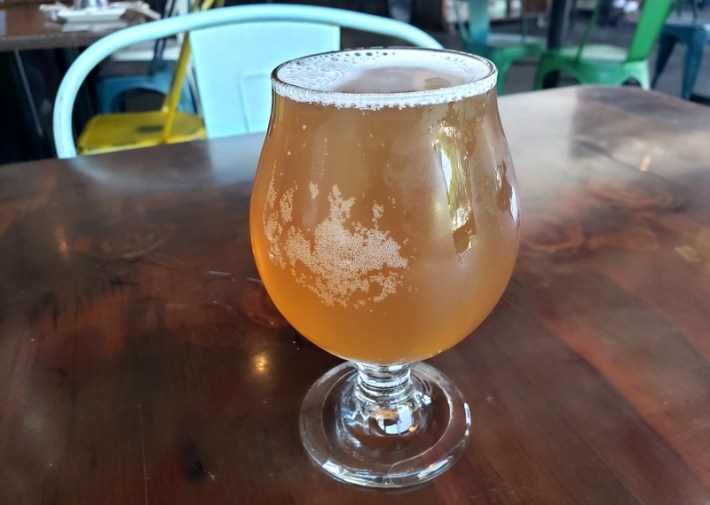
Whether you champion the decision or are somewhere sharpening your sickle, we’re at Sage to try some interesting new entries onto the L.A. Mexican food scene. Among a vast menu of fried tofu banh mis, regenerative mozzarella pizzas, and curries both carnivorous and cruelty-free, two items popped out at us, as they probably should: grazed bison tacos and tallow-fried venison flautas.
Venison (deer meat) and bison are both game meats crucial to the Indigenous diet on this continent, more commonly found today in the second freezers of hunters than in between tortillas, though perhaps not as much an oddity locally as, say, the pig punany carnitas at Highland Park’s Metro Balderas or the cock of bull served at Feng Mao in KTown.
Sage gets its bison meat, which is pasture-raised and grass-fed, from a meat company named Force of Nature, which itself sources the lean meat from regenerative ranches, including one called ROAM in Central Texas. The venison is from Texas’s Broken Arrow Ranch, which claims to cull antelope, venison, and boar from overpopulated ranches and does its own harvesting through a mobile facility, with an unusual openness to government meat inspectors.
Ever more stimulating to us taco nerds, the tortillas used in both the flautas and tacos, of which there are a few examples on the menu, are made from green Oaxacan corn grown at Eden Forest Collective (nee Sow A Heart), the Fillmore farm Engelhart formerly owned* and operated with her husband, Elias Sosa, who grew up farming the same corn with his dad in Oaxaca.
The couple, who met while working together at Sage, ran LAist through how they keep this nutrient-hungry corn more sustainable by employing ravenous sheep, replenishing soil, and planting other symbiotic crops.
Passing on a CBD seltzer for an “Orange Dreamsicle” kombucha, judgment be damned, from the farm’s own Sage Brews brand, the first plate to hit our table were the venison flautas, a trio of rolled tacos heavy with a haul of cilantro-cream, guacamole, chopped tomatoes, and lettuce on top.
Perhaps the most pressing question for L.A.’s meat-eating majority and the future of the planet, as hundreds of grills burn nightly in L.A.’s nebula of asada masters and spinning trompos of roasted pork, will the promise and yield of these bison and venison tacos be enough to sway you away from the chile verde at El Ruso across the street?
The flautas are crunchy, the flavors are all fresh, and the flauta entrails are soft and smooth. The venison, fried in grass-fed tallow from Fatworks, is mixed with adobo potatoes, which seem to dominate the alloy and mute its flavors. Spackled to the sides of the tortilla is a mellow A2 cheese from regenerative-centered Origin Milk.
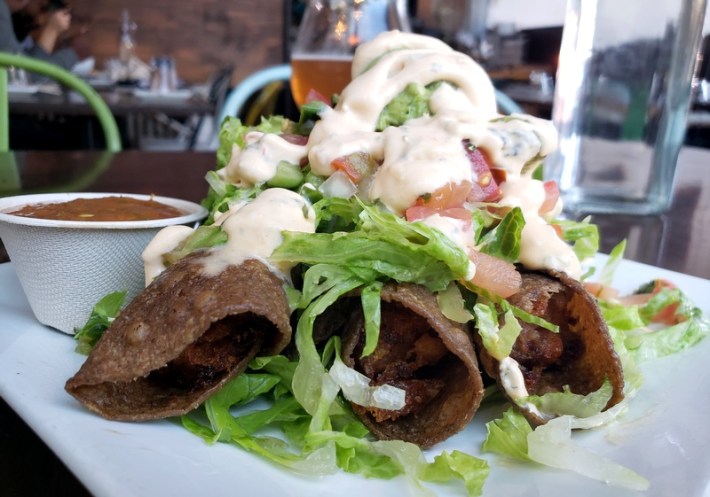
We liked the flautas, which were great in overall form, if not the dirtiest of details. But we may have preferred a more pronounced venison flavor, considering the curio of having game meat in a taco, which is what brought us to the table in the first place. Of course, given the bistro’s vegan background, maybe making meat stand out isn’t exactly the point.
On that note, once the flautas were done, we were left with a big, delicious salad on our plates. You can take the vegan out of the name, but…
Our mouth was moderately on fire from a salsa roja that had balanced heat, but just a little too much resemblance in flavor to tomato sauce, albeit one made with really great tomatoes.
The taste of the bison in our tacos was notably more present and dynamic. Peering into our crema-sodden tortillas, the grass-fed meat looked to be formed into patties. The bison had a livery, spiced, and beefy essence, smacking of compelling game meat that better mirrors the taste of the land itself than the venison-and-spud composite did. We pinned its flavor as a hybrid between a sausage patty and a burger with black pepper.
These Mexican-inspired dishes from Sage can definitely scratch the itch when you crave antojitos without the usual fat and calories with the usual meats. Both venison and bison are factually and detectably leaner, and both dishes were free of greasiness, certainly feeling like healthier options on the spectrum.
So whether regenerative farming can save us from the avariciousness and mass-murderousness of corporate “farmers,” fucked-up meat companies, and their legions of lawyers and lobbyists opposing sensible, potentially earth-saving reforms, or whether it’s the latest false hope of a starry-eyed cult, fooling itself while our beds are burning, you have a unique and lighter new taco option at Sage’s Echo Park and Pasadena locations.
Options we can only imagine are measuredly better than the sodium phosphate-injected chicken products or cannibal-bovine burgers all too commonly reigning over the U.S. landscape.
Many may agree. Many may disagree.
Perhaps the most pressing question for L.A.’s meat-eating majority and the future of the planet, as hundreds of grills burn nightly in L.A.’s nebula of asada masters and spinning trompes of roasted pork, will the promise and yield of these bison and venison tacos be enough to sway you away from the chile colorado at El Ruso across the street?
Only time will tell.
Sage Regenerative Kitchen & Bistro ~ 1700 W. Sunset Blvd. Los Angeles, CA 90026; 41 Hugus Aly. Pasadena, CA 91103
*a correction was made here as Engelhart and her partner no longer own the property but still source ingredients from there.
